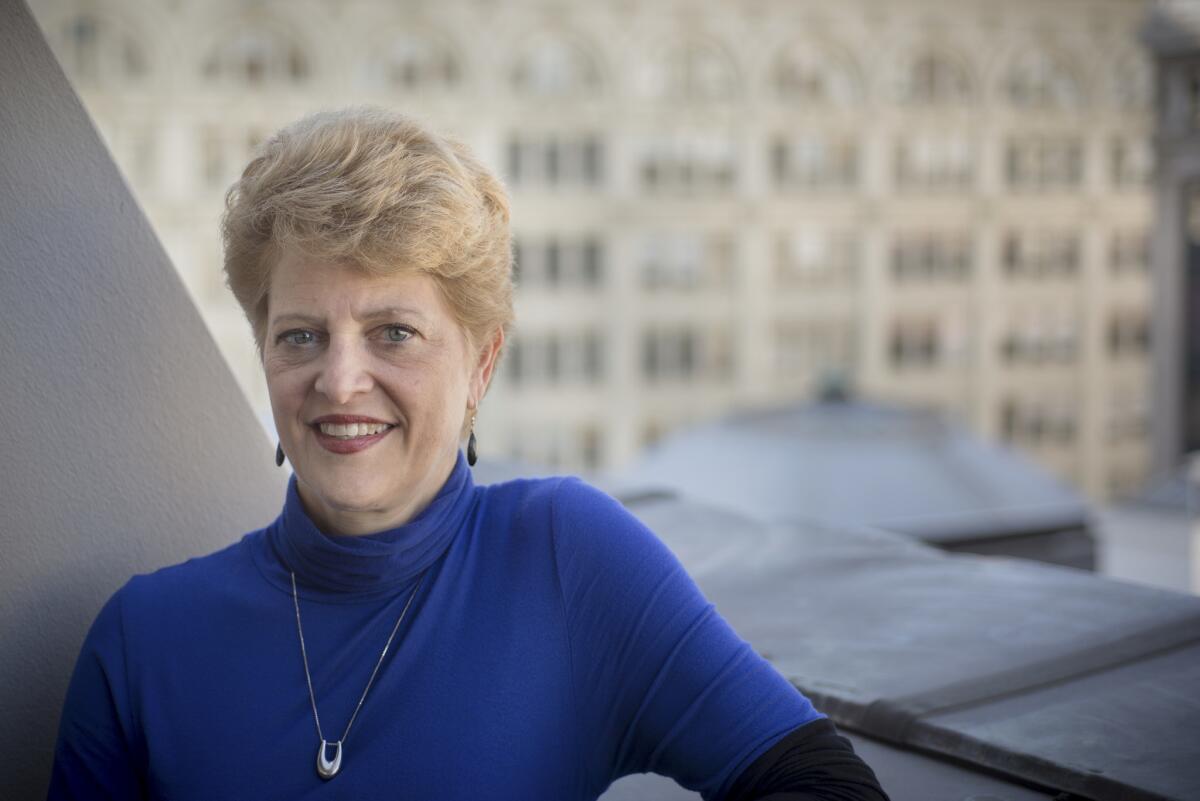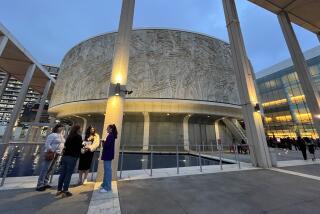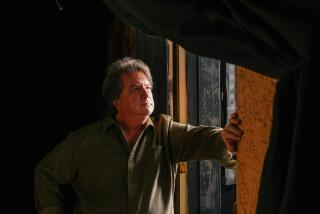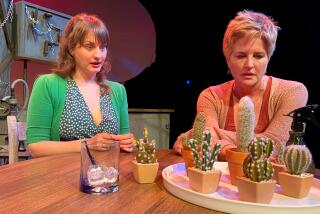Critic’s Notebook: Out of Carey Perloff’s ‘Chaos’ comes theatrical harmony

Carey Perloff at the headquarters of the American Conservatory Theatre.
Carey Perloff, now in her 23rd season as artistic director of San Francisco’s American Conservatory Theater, doesn’t mince words when talking about the challenges confronting the American theater, a principal subject of her fiery new memoir, “Beautiful Chaos: A Life in the Theater.”
She’s disturbed by the way “many large-scale institutional theaters today have become roadhouses to incubate commercial productions headed for Broadway,” alarmed at the “relative paucity of female voices rising to the top of our profession” and frustrated that funding sources are so heavily focused on new-play development that there is “virtually no support for the training of actors” and not all that much for new approaches to the classics.
If you get the chance to discuss these matters with her, she will forcefully back up her claims, lucidly elaborate the cultural and ethical implications and passionately make the case that the theater, though increasingly marginalized, is vital to the healthy functioning of our democracy. She might even stop for breath, as she did once or twice when we met for coffee this month, though don’t count on it.
These days, in addition to the demands of a book tour, she’s preparing for the opening of the Strand Theatre, A.C.T.’s long-awaited second stage in the Central Market neighborhood between the impoverished Tenderloin community and San Francisco’s new tech corridor. (Ever ambitious, Perloff wants the theater to serve as “connective tissue.”)
And somehow, while leading one of the country’s largest nonprofit theaters and lining up her own projects as a director, she has found room for a burgeoning and somewhat unforeseen career as a playwright. Her play “Kinship,” which had its world premiere last year in Paris in a production that starred Isabelle Adjani, will have its American debut this summer at the Williamstown Theatre Festival in a Jo Bonney production led by Cynthia Nixon.
An artist and chief executive who is as comfortable in the board room as she is in the rehearsal hall, Perloff cuts a formidable figure. Although she wouldn’t be considered in the first rank of American directors — neither an avant-garde visionary nor a Broadway bigwig, she’s the first to admit she’s “never been a darling of the press” — Perloff is one of the most principled and dynamic stewards of a nonprofit theater in this country. She is also one of the most articulate.
The daughter of literary critic and Stanford and USC professor Marjorie Perloff and the late UCLA cardiologist Dr. Joseph K. Perloff, she said that culture was the family religion. Growing up in Washington, D.C., Perloff recalls traipsing through the Smithsonian and the Phillips Collection on weekends and training at the ballet barre. The dramatic stage may have supplanted her first artistic loves, but one thing she likes about directing is the way it calls upon “every skill set you’ve learned in your life.”
Proud of her Jewish heritage and mindful of its history (her mother was a Viennese refugee in the late 1930s), she is still practicing the family’s unofficial religion. Whether going hat in hand to the executives at Twitter to ask for money or speaking to students in A.C.T.’s MFA program in acting, she is driven by her secular faith in the theater as a bridge for disparate communities and as a forum for literature that is meant to be lived. The stage, as she observes in her book (much of it written within commuting distance from Silicon Valley), is “the yang of technology’s yin,” meaning “live experience, narrative, character, immersion.”
Perloff studied classics and comparative literature at Stanford, and it was there that she fell in love with ancient Greek theater. A fateful encounter with Aristophanes’ “The Frogs” introduced her to, as she writes, “a universe in which the answer to a population struggling with war and political chaos was better drama.”
“Because I started with the Greeks, I love plays that put the culture on stage,” she said. “I’m drawn to work that’s large-scale, muscular, epic — Schiller, Brecht, Tom Stoppard, plays with choruses. But I also have a minimalist side.” Before taking over A.C.T., Perloff was the artistic director of Classic Stage Company, an intimate off-Broadway venue in which she investigated the classics up close, often in bold new translations, while getting better acquainted with the work of Beckett and Pinter, the latter of whom is the source of some of the book’s most vivid anecdotes.
Perloff describes herself as a “big picture” person. She has the greatest respect for actors, credits them with teaching her how to be a director and has struggled against nearly impossible odds to maintain a core acting company (a fight, she writes, that “has all but defeated” her recently). But as a theater artist she prefers looking at the whole canvas to taking a “deep dive” into the experience of a single character.
That pattern of mind is in evidence in a book that is personal only to the extent that it sheds light on professional concerns. Perloff has sifted through her experience to ask tough questions of her institution, her own leadership and a theater community that has had trouble of late living up to its ideals. Truth matters more to her than political delicacy. She doesn’t suffer fools gladly, and her opinions about colleagues, productions and hot-button cultural issues can sting.
“I am going to get in so much trouble,” she said to me a few days earlier at Samuel French Theatre & Film Bookshop in Hollywood, where she appeared to discuss her book. She was delighted that many graduates of A.C.T.’s MFA program in acting attended, but it didn’t escape her notice that her artistic director peers from Los Angeles’ resident theaters were absent (or that the following day while speaking at the Old Globe her San Diego colleagues were present).
Perloff’s book rebukes those nonprofit leaders recycling Broadway chestnuts to balance the books. She quotes from a letter Arena Stage co-founder and longtime producing director Zelda Fichandler wrote to the U.S. Department of the Treasury in the 1950s arguing that regional theaters should be accorded nonprofit status: “Once we made the choice to produce our plays not to recoup an investment but to recoup some corner of the universe for our understanding and enlargement, we entered into the same world as the university, the library, the museum, and the church, and became, like them, an instrument of civilization.”
The Geary, A.C.T.’s historic theater that was restored after sustaining damage in the 1989 earthquake, is a challenging house for noncommercial work given its vast size and grandeur. But instead of trying to compete with the touring Broadway offerings of the adjacent Curran Theatre, Perloff has held fast to the guiding principles of the nonprofit theater movement, producing classic plays of epic scope along with new work that can perform well in a theater she compares to Wimbledon.
Such a description might seem to preclude trailblazing new writing, but Anne Washburn’s “Mr. Burns, A Post-Electric Play,” in which “The Simpsons” finally gets its “Decameron” moment, just finished an acclaimed run at the Geary.
“My colleagues around the country thought I was crazy for putting ‘Mr. Burns’ in a thousand-seat house, but it’s an epic play that asks enormous questions,” Perloff said. “We co-produced the work with the Guthrie Theatre, got amazing press and surpassed our income goals. Every night 50 people walked out, but we had a lot of dialogue with our audience, and by now I feel that they are willing to give us the benefit of the doubt.”
Would she have done “Mr. Burns” had it not received a rave in the New York Times when it was produced at Playwrights Horizons? “The audience at A.C.T. has a little bit of that California ‘We’ll make up our minds’ sensibility,” she said. “They don’t always warm to work that did well in New York. Conversely, things that didn’t land so well in New York, they’ve sometimes really warmed to.”
In an age of diminished public funding, celebrity enthrallment and high quality on-demand television, Perloff recognizes that the only chance she has of keeping up the nonprofit fight is by sustaining the bond between her theater and its unique community.
She is candid about the disaster of her first season, when subscribers bombarded her with letters of complaint over an audacious (and apparently undercooked) production of “The Duchess of Malfi,” and the Catholic Church was up in arms about Dario Fo’s “The Pope and the Witch,” which, per Perloff, “depicts the upheavals caused when an eager Pope, in thrall to a drug-trafficking Witch, wakes up one morning suddenly believing in the right of women to obtain free abortions on demand.”
“Beautiful Chaos” is a testimony to what a strong leader can accomplish when she is willing to listen, adjust, yet stay true to her principles. This is a book that every artistic director in the country must read, but it’s also one that would benefit quite a few corporate executives.
Perloff has gleaned invaluable lessons on the educative role of failure, on balancing creative risk-taking with institutional stability and on the structural obstacles that are preventing women from assuming leadership positions in proportion to their numbers. (Perloff’s anecdotes on running a theater while raising two children with her attorney husband are funny, poignant and possibly more useful than anything found in Sheryl Sandberg’s “Lean In: Women, Work and the Will to Lead.”)
Twenty plus years is a long time to be at the helm of an institution, but Perloff doesn’t plan to leave. Her playwriting has been rejuvenating that part of her that sometimes feel trampled by administrative exigencies. “I spend my life fundraising,” she moaned. The vibrancy of San Francisco — “a city of the future like Los Angeles,” she said — inspires her, with its cycles of newcomers and demographic shifts “going back to the Gold Rush.” Her mentor and frequent collaborator, Olympia Dukakis, once told her that A.C.T. is the envelope holding her investigations as an artist, and it’s part of the reason, Perloff explained, that the chaos of the book’s title seems beautiful, in the sense of harmonious, and not overwhelming.
Galvanizing her these days is the opening of the Strand. The inaugural production in June will be “Love and Information,” Caryl Churchill’s cutting-edge work of 57 rearrangeable micro-scenes exploring the tenuousness of human connection in an age obsessed with data collection. Perloff said the play’s director, Casey Stangl, plans to start the production in the lobby and that there might even be pop-up scenes at Twitter’s nearby Market Street headquarters.
Perloff wants to see whether in “a city with more and more marked inequality” the Strand can serve as a conduit to neighborhoods that are barely on speaking terms. Her appeals to Twitter for philanthropic support haven’t yet paid off, but she won’t rest until community activists are seated next to young tech millionaires at a play whose wisdom can’t be condensed to 140 characters or consumed while multi-tasking on a smartphone. The theater, around for millennia, is gearing up under her guidance for a new epoch in San Francisco.
Twitter: @CharlesMcNulty
More to Read
The biggest entertainment stories
Get our big stories about Hollywood, film, television, music, arts, culture and more right in your inbox as soon as they publish.
You may occasionally receive promotional content from the Los Angeles Times.







